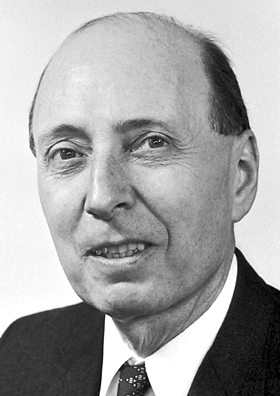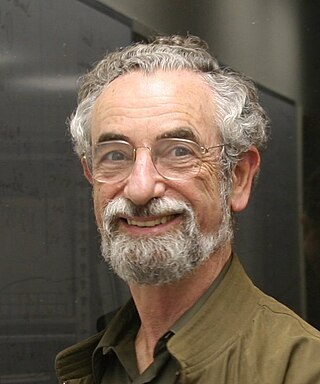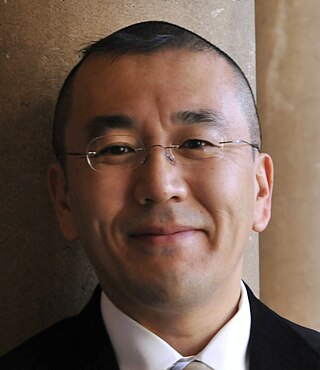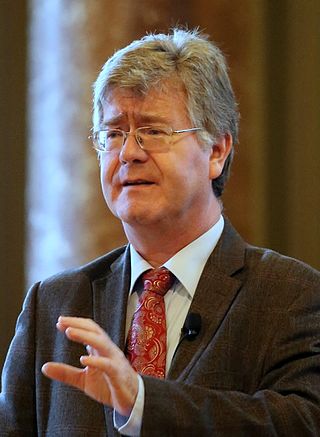Related Research Articles

Eugene Paul "E. P." Wigner was a Hungarian-American theoretical physicist who also contributed to mathematical physics. He received the Nobel Prize in Physics in 1963 "for his contributions to the theory of the atomic nucleus and the elementary particles, particularly through the discovery and application of fundamental symmetry principles".

Hermann Klaus Hugo Weyl, was a German mathematician, theoretical physicist, logician and philosopher. Although much of his working life was spent in Zürich, Switzerland, and then Princeton, New Jersey, he is associated with the University of Göttingen tradition of mathematics, represented by Carl Friedrich Gauss, David Hilbert and Hermann Minkowski.

Elliott Hershel Lieb is an American mathematical physicist and professor of mathematics and physics at Princeton University who specializes in statistical mechanics, condensed matter theory, and functional analysis.

Bertram Kostant was an American mathematician who worked in representation theory, differential geometry, and mathematical physics.

Giorgio Parisi is an Italian theoretical physicist, whose research has focused on quantum field theory, statistical mechanics and complex systems. His best known contributions are the QCD evolution equations for parton densities, obtained with Guido Altarelli, known as the Altarelli–Parisi or DGLAP equations, the exact solution of the Sherrington–Kirkpatrick model of spin glasses, the Kardar–Parisi–Zhang equation describing dynamic scaling of growing interfaces, and the study of whirling flocks of birds. He was awarded the 2021 Nobel Prize in Physics jointly with Klaus Hasselmann and Syukuro Manabe for groundbreaking contributions to theory of complex systems, in particular "for the discovery of the interplay of disorder and fluctuations in physical systems from atomic to planetary scales".

William Conyers Herring was an American physicist. He was a professor of applied physics at Stanford University and the Wolf Prize in Physics recipient in 1984/5.

Joseph Henry Eberly is a physicist who holds the positions of Andrew Carnegie Professor of Physics and Astronomy and Professor of Optics at the University of Rochester.

Harry Jeannot Lipkin, also known as Zvi Lipkin, was an Israeli theoretical physicist specializing in nuclear physics and elementary particle physics. He is a recipient of the prestigious Wigner Medal.

Hirosi Ooguri is a theoretical physicist working on quantum field theory, quantum gravity, superstring theory, and their interfaces with mathematics. He is Fred Kavli Professor of Theoretical Physics and Mathematics and the Founding Director of the Walter Burke Institute for Theoretical Physics at California Institute of Technology. He is also the director of the Kavli Institute for the Physics and Mathematics at the University of Tokyo and is the chair of the board of trustees of the Aspen Center for Physics in Colorado.

A trojan wave packet is a wave packet that is nonstationary and nonspreading. It is part of an artificially created system that consists of a nucleus and one or more electron wave packets, and that is highly excited under a continuous electromagnetic field. Its discovery as one of significant contributions to the Quantum Theory was awarded the 2022 Wigner Medal for Iwo Bialynicki-Birula
John Lawrence CardyFRS is a British–American theoretical physicist. He is best known for his work in theoretical condensed matter physics and statistical mechanics, and in particular for research on critical phenomena and two-dimensional conformal field theory.

Edward Vladimirovich Frenkel is a Russian-American mathematician working in representation theory, algebraic geometry, and mathematical physics. He is a professor of mathematics at University of California Berkeley, a member of the American Academy of Arts and Sciences, and author of the bestselling book Love and Math.
In theoretical physics, the logarithmic Schrödinger equation is one of the nonlinear modifications of Schrödinger's equation. It is a classical wave equation with applications to extensions of quantum mechanics, quantum optics, nuclear physics, transport and diffusion phenomena, open quantum systems and information theory, effective quantum gravity and physical vacuum models and theory of superfluidity and Bose–Einstein condensation. Its relativistic version was first proposed by Gerald Rosen. It is an example of an integrable model.
In mathematical physics, the De Donder–Weyl theory is a generalization of the Hamiltonian formalism in the calculus of variations and classical field theory over spacetime which treats the space and time coordinates on equal footing. In this framework, the Hamiltonian formalism in mechanics is generalized to field theory in the way that a field is represented as a system that varies both in space and in time. This generalization is different from the canonical Hamiltonian formalism in field theory which treats space and time variables differently and describes classical fields as infinite-dimensional systems evolving in time.

Wolfgang P. Schleich is professor of theoretical physics and director of the quantum physics department at the University of Ulm.
Yvette Kosmann-Schwarzbach is a French mathematician and professor.

Anne Geneviève L'Huillier is a French-Swedish physicist, and professor of atomic physics at Lund University in Sweden.
Maciej Lewenstein, is a Polish theoretical physicist, currently an ICREA professor at ICFO – The Institute of Photonic Sciences in Castelldefels near Barcelona. He is an author of over 480 scientific articles and 2 books, and recipient of many international and national prizes. In addition to quantum physics his other passion is music, and jazz in particular. His collection of compact discs and vinyl records includes over 9000 items.

The Marian Smoluchowski Medal is a Polish annual science award conferred by the Polish Physical Society for contributions in the field of physics.
The Workshop on Geometric Methods in Physics (WGMP) is a conference on mathematical physics focusing on geometric methods in physics. It is organized each year since 1982 in the village of Białowieża, Poland. It is organized by the Chair of Mathematical Physics of Faculty of Mathematics, University of Białystok. Its founder and main organizer is Anatol Odzijewicz.
References
- ↑ "The Wigner Medal Bylaws" (PDF). The Group Theory and Fundamental Physics Foundation. Retrieved 2007-08-07.
- ↑ "The Wigner Medal". The Group Theory and Fundamental Physics Foundation. Retrieved 2007-08-07.
- ↑ "Wigner Medal Ceremony for Prof. Dr. Yvette Kosmann-Schwarzbach". Institut Henri Poincaré. 2023-10-24. Retrieved 2023-10-22.
- ↑ "Wigner Medal ceremony for Professor Iwo Bialynicki-Birula". Center for Theoretical Physics, Polish Academy of Sciences. Retrieved 2023-06-30.
- ↑ "From GHZ to Tic Tac Toe: A Symposium to celebrate Danny Greenberger's 90th birthday". www.iqoqi-vienna.at (in German). Retrieved 2023-10-22.
- ↑ "International Colloquium on Group Theoretical Methods in Physics | ICGTMP" . Retrieved 2023-10-08.
- ↑ "The Weyl-Wigner Award | International Colloquium on Group Theoretical Methods in Physics" . Retrieved 2023-10-08.
- ↑ "Hermann Weyl Prize". The 34th International Colloquium on Group Theoretical Methods in Physics. Retrieved 2023-10-22.
- ↑ Wigner Medal Homepage
- ↑ "Professor Emeritus Alden Mead receives Wigner Medal". University of Minnesota Department of Chemistry. Retrieved 2012-07-16.
- ↑ "The XXIX International Colloquium on Group-Theoretical Methods in Physics". Chern Institute of Mathematics, Nankai University. Retrieved 2012-07-16.
- ↑ "Wigner Medal awarded to Professor Joshua Zak". Technion – Israel Institute of Technology – Physics Department. Retrieved 2014-03-18.